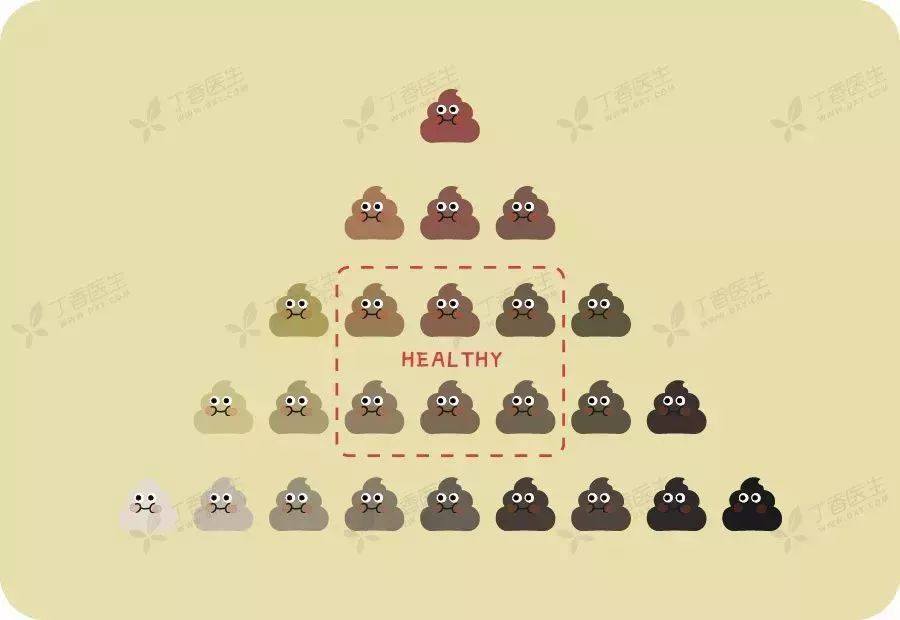
Friends often ask Dr. Clove backstage:
I defecate 2 ~ 3 times a day, and there is no other abnormality. Is it diarrhea?
I haven’t defecated for 3 days, does it matter?
It seems that in our impression, it is normal to defecate once a day. Especially if you defecate regularly in the morning every day, you will feel that the whole person is unobstructed and not too comfortable!
On the contrary, if you poop many times during the day or if you do not poop during the day, many people will feel uncomfortable and feel that something is wrong with them.
But is this really the case? Let’s ask a professional doctor to answer it.
What is the normal frequency of poop?
Refer to the diagnostic criteria for constipation and diarrhea respectively. When the frequency of poop is between 3 times a week and 3 times a day, it usually does not make us feel uncomfortable and can be regarded as normal.
However, the frequency of poop is not so important.
When raising children, we often say that [every child is unique], but in fact everyone’s poop is also unique.
Different foods, different moods, different intestinal flora and other factors will cause fluctuations in the frequency of poop, so there is no strict standard for the frequency of poop. As long as you can accept this frequency and do not feel uncomfortable due to the frequency and process of poop.
If you feel uncomfortable because you don’t have poop for a day, it is more likely to be psychological anxiety than a real digestive tract disease.
Don’t embarrass yourself or poop. Love it, give it freedom, and accept its uniqueness.
However, if there is a problem with the number of poops, you can also try the following methods.
Too many poop times, first deal with the situation
If you poop more than 3 times a day and each time is very thin, like water, you have diarrhea.
1. Eating unclean food
If diarrhea comes in a hurry, accompanied by abdominal discomfort or pain, even vomiting and fever, it is usually due to eating unclean things and the duration will not be too long.

2. Irritable bowel syndrome
Functional gastroenteropathy is the main cause of chronic diarrhea, which has corresponding diagnostic basis clinically and needs to exclude organic diseases. Among them, irritable bowel syndrome is the most common functional gastroenteropathy.
Unfortunately, the current treatment for irritable bowel syndrome cannot achieve immediate results. Food restriction and treatment for intestinal flora are only effective for a small number of patients. It is mainly influenced by emotional and psychological factors, and the mechanism is similar to [running to the toilet when nervous].
Therefore, keeping a happy mood can relieve the situation to a certain extent.
To be a human being, happiness is the most important thing.
3. Ulcerative colitis
If you poop more frequently and for a long time, and your poop contains mucus and blood, and your abdomen feels pain at the same time, you must go to the hospital to see if you have ulcerative colitis.
What if the number of poops is too small?
Constipation is a very common thing, don’t be shy. At this time, the poop is dry and hard, and even hurts when pulling. The number of defecations is generally less than 3 times a week.
The feeling of [not wanting] has been understood before.
If it cannot be solved, laxative drugs can be considered to help defecate.
However, it is recommended to choose laxative drugs under the guidance of doctors. For most people, hypertonic laxatives such as lactulose may be more suitable, and aloe capsules, senna leaves and Changqing tea from what are not recommended as the first choice.
However, in order to treat constipation, one should first change one’s lifestyle: exercise more, drink more water, eat more vegetables, fruits and coarse grains…

Another important point is that concentrate on poop and don’t always think about mobile phones!
As long as you pull with a devout heart, don’t play with your mobile phone, don’t be distracted, most of the time, poop is still a good poop.
However, in order to judge whether poop is normal, besides the frequency of poop, attention should also be paid to the shape and color of poop.
The color and shape of poop also affect health.
1. Poo color: brown or golden
The color of normal poop is brown or golden yellow, which is related to the intestinal and hepatic circulation of bile acid in the body.
What is bile acid? What is intestinal liver circulation?
These questions are not very important. What is important is that if the color of poop changes, it may be a hint to you: Hello! There is something wrong with your body, pay attention!

If it turns white (kaolin-like), black (asphalt-like), or red (bloody stool), consider going to the hospital.
Here, let’s talk about black poop alone. Diet will have certain effects. Eating foods such as pig blood will lead to black poop. However, black poop may mean gastrointestinal hemorrhage, especially upper gastrointestinal hemorrhage.
Therefore, in the face of this color of poop, we must be more vigilant and go to the hospital when necessary.
2. Poo shape: there are pictures and the truth,
According to the professional Bristol stool classification, the normal stool shape is generally between 3 and 5, and looks like bananas or sausages.

However, just as there is no strict requirement on the frequency of poop, the shape of poop is also allowed to fluctuate, thinner or drier, which is not necessarily abnormal.
However, if the poop suddenly changes obviously and its shape is not normal all the time, it should be noted that the body may be calling the police.
What should I do? Of course it is-to the hospital!
